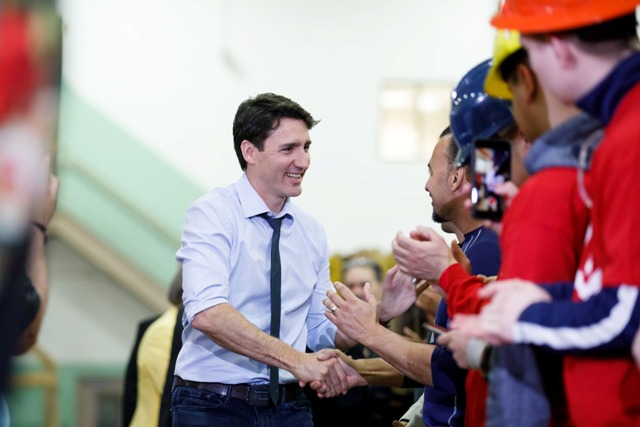 "Once seen as a lightweight, he was re-elected despite the scandals, the dissent and the inevitable disillusion with his well-burnished image." [Photo: Justin Trudeau's Facebook page]
"Once seen as a lightweight, he was re-elected despite the scandals, the dissent and the inevitable disillusion with his well-burnished image." [Photo: Justin Trudeau's Facebook page]
Justin Trudeau won Canada’s federal election but was left weaker and scarred. His Liberals are now a minority government, while humiliating pictures of him in ‘blackface’ make-up emerged and shredded his progressive reputation. The embattled prime minister will struggle now to pursue his own agenda as he faces almost irreconcilable demands from federal and provincial leaders in return for their support.
The Liberals won 157 ridings, or constituencies, to the opposition Conservatives’ 121, but secured just 33.1% of the vote to 34.4% respectively. It is the lowest share ever for Canada’s winning party. A low turnout of 66% suggested disenchantment with all of the main parties. The left-wing New Democratic Party (NDP) slumped to 24 seats on 15.9% of the vote (from a stunning 102 seats in the 2011 election, when they supplanted the Liberals as the official opposition), while the Bloc Québécois won 32 seats (up from 10). Of the 19 other choices for voters, only two made any impression at the ballot box: the Greens won three seats with 6.5% of the vote, while the far-right People’s Party – formed a year ago around a Trumpian nativist platform – won no seats on just 1.6%.
There was a backlash from voters in the conservative western provinces to a perceived Ottawa-Toronto-Montreal consensus, seen in extreme form in one comment below a Huff Post article: ‘Time for Alberta, Saskatchewan and Manitoba [to] seriously consider joining the USA, and if the Maritimes are wise they should consider the same thing.’
There are parallels with Trudeau’s father, Pierre, who was first elected at the head of the Liberals in 1968 amid ‘Trudeaumania’, much as Justin Trudeau was unexpectedly swept to power in 2015 (see Commonwealth Update, Nov 2015). The conversation around both was much about their looks and personality as their progressive politics. Both father and son saw initial enthusiasm for their premiership dissipate and suffered chastening setbacks in their second elections; Trudeau Sr gained only two seats more than the Progressive Conservatives in 1972, while his son won 157 to 121 for Andrew Scheer’s Conservatives but still left 13 seats short of a majority.
Trudeau had ruled out a coalition and reconvened parliament for early December, saying he would try to get opposition parties to back his minority government and policies, such as tax cuts and steps against climate change. Tough negotiations lie ahead, not least with his own backbenchers, who will feel emboldened in a minority government. Trudeau will have a particularly difficult time with Conservative premiers, whom he accused of imposing harmful cuts, ignoring climate change and trying to limit abortion. Scheer’s response was blunt: ‘Trudeau has attacked our energy sector, has ignored the concerns of Alberta and Saskatchewan and has demonized premiers who disagree with him … the results last night speak for themselves.’ Scott Moe, Saskatchewan premier, said: ‘The sense of frustration and alienation in Saskatchewan is now greater than it has been at any point in my lifetime.’ Moe’s ‘new deal’ demands include scrapping a federal carbon tax, pipelines for oil exports and a new federal ‘equalization’ formula to share out tax revenues of energy-rich prairie provinces. Alberta’s premier, Jason Kenney, tweeted: ‘Deep frustration expressed by Albertans is very real … We must get pipelines built & get a fair deal in the federation.’
Despite a sharp decline in seats for the NDP, its leader, Jagmeet Singh, could yet become the kingmaker and his demands would sit more easily with Trudeau. Singh said: ‘We want to see investments in healthcare … housing more affordable … help out students … real action on climate justice.’ The Bloc Québécois leader, Yves-François Blanchet, said his party was prepared to use the ‘strong leverage’ of its 32 seats. High on its wishlist are that Quebec gets more power over immigration and tax, and Ottawa does not block its controversial secularism law. Ontario’s premier, Doug Ford, has his eyes on funding for a C$11bn ($8bn) Toronto transport project.
Trudeau possibly exceeded expectations, surviving two scandals that would have derailed many political careers. One involved claims earlier this year that the former attorney-general Jody Wilson-Newbould had been pressured, for political considerations, not to pursue a trial against SNC-Lavalin, a big engineering firm, over bribery allegations. Two minister resigned. The other was more shocking: several pictures of Trudeau in ‘blackface’ minstrel make-up at school and even as a teacher in 2001. It was all the more surprising given Trudeau’s canny awareness of the ‘optics’ of high-profile politics. One Canadian writer likened the SNC-Lavalin scandal to ‘watching a unicorn get flattened by a lorry’, but when the blackface pictures emerged she ruefully concluded: ‘He’ll do anything to please an audience and consider the consequences later.’ Another said his ‘fake progressivism’ had been exposed.
In the end it didn’t matter. Once seen as a lightweight, he was re-elected despite the scandals, the dissent and the inevitable disillusion with his well-burnished image, showing he may be as unassailable as his father – and perhaps another unlikely leader in North America.



